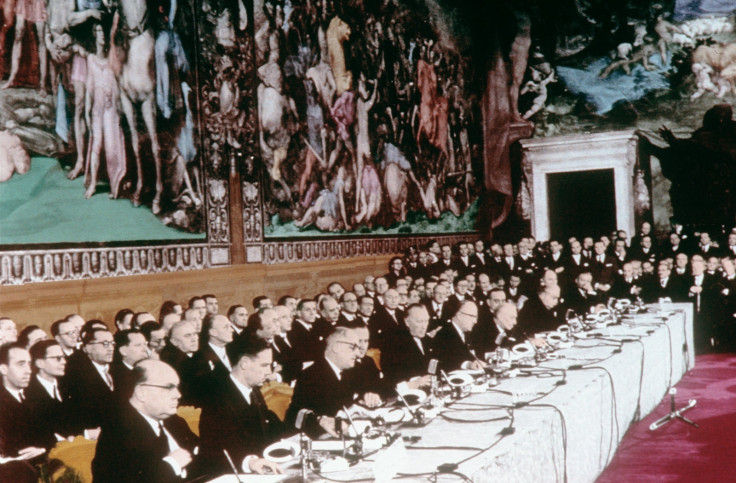The EU-founding Treaty of Rome turns 60 days before Brexit begins
The Treaty of Rome created the EU's 'common market' and the UK will be the first member state to leave.
The Treaty of Rome was signed on 25 March, 1957, by the governments of Belgium, Germany, France, Italy, Luxembourg and the Netherlands.
It created the European Economic Community and committed signatories to "ever closer union". It was a major step towards what would become the European Union (EU).
Part of the EEC was building a "common market" between participating countries which allowed for the free movement of goods, people, services and capital.
Before the Treaty of Rome, there was the Treaty of Paris in 1951, the treaty that established the European Coal and Steel Community. This had the same six signatories as Rome but only created a common market for coal and steel. Rome had much bigger ambitions.
The idea was to spur on economic growth and closer relations between interdependent European countries, cementing the peace of the post-war period and preventing a repeat of the devastating conflicts of the first half of the twentieth century.
Twice since 1957 has the treaty been updated and renamed, gradually developing and expanding the EEC into the EU. Originally, the Rome treaty's official title was the Treaty Establishing the European Economic Community.
In 1993, a new treaty came into force, agreed at Maastricht the year before. This was called the Treaty Establishing the European Community and replaced Rome. In 2007, it became the Treaty Establishing the European Community, or the Lisbon Treaty.

In 1973, the original six EEC member states were joined by Denmark, Ireland and the UK. In 1981, Greece joined, followed in 1986 by Portugal and Spain. In 1995, after Maastricht paved the way for the creation of the euro and the single currency area, Austria, Finland, and Sweden joined what was now the EU.
The EU expanded eastwards in 2004. Poland, Czech Republic, Slovakia, Slovenia and Hungary joined as well as Estonia, Cyprus, Latvia, Lithuania and Malta. In 2007, Bulgaria and Romania joined, and Croatia was the last in 2013.
There are also several candidate countries in the process of integrating EU legislation into their own national law. These are Albania, Montenegro, Serbia, the former Yugoslav Republic of Macedonia, and Turkey.
In a first, one member state – Britain – is leaving the EU following a referendum on 23 June, 2016, in which the country voted for what is dubbed 'Brexit'. On 29 March, 2017, Theresa May will trigger Article 50 of the Lisbon Treaty, which kickstarts the formal two-year process of negotiations to leave.
© Copyright IBTimes 2024. All rights reserved.







